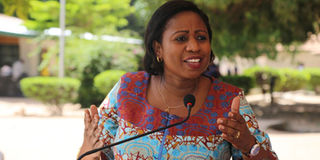Poor hygienic practices cost Tanzania Sh340 billion annually, says minister

Health minister Ummy Mwalimu
What you need to know:
Health minister Ummy Mwalimu revealed this saying that out of 100 patients attending health facilities on the daily basis, at least 60 were suffering from diseases caused by poor sanitation.
Dodoma. Tanzania loses over Sh340 billion annually as it fights against such diseases as diarrhea, cholera and typhoid all due to poor hygiene throughout the country.
Health minister Ummy Mwalimu revealed this saying that out of 100 patients attending health facilities on the daily basis, at least 60 were suffering from diseases caused by poor sanitation.
Minister Mwalimu was speaking on Wednesday, December 5, during her tour of Umekwa Village, Haneti Ward in Chamwino District, some 95 kilometres from Dodoma Municipality.
She added that there were still many households that did not have latrines and relieved themselves in the bush and did not observe hygienic practices including washing hands with soap.
The minister reminded communities that the country may not attain its industrialization dream if community members would fail to observe hygienic conditions and sanitary practices.
“It’s a major setback that such amount of money, Sh340 billion, is spent on treating these diseases which could have been prevented had people observed proper sanitation. The money could be directed to support other development projects. Truth be told, more than 60 per cent of Tanzanians are very poor in hygiene,” she said.
In another development, Vice-President Samia Suluhu will today launch a National Sanitation Campaign (Phase II) at Chang’ombe Primary School in Dodoma Municipality.
The three-year ‘Behaviours Change and Communication’ Campaign, will see at least Sh5.8 billion used for improving sanitation in the country.
“The campaign will come with a number of fresh initiatives, including adjustment of relevant (sanitation) regulations targeted to assure each households to have a latrine, but also, there will be series of training among health workers as well as awareness campaign to communities.




